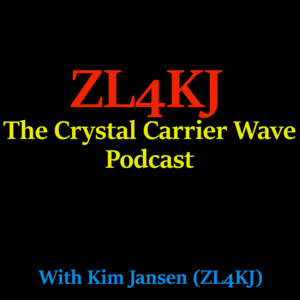
Nvidia reported to have been forced from the Chinese market, $5bn deal with Intel suggests that Nvidia is not that concerned as it takes roughly 4% ownership of its competitor.
Reports claim that China’s move comes from increased domestic alternatives such as Huawei’s Ascend 910C and CloudMatrix 384 which already out perform Nvidia’s H20 chip.
Welcome to episode 1 of the Crystal Carrier Wave Podcast. The show comes after a long hiatus in the podcasting space, I initially started podcasting in late 2005, primarily I was only doing a journal podcast that was limited to an audience of family and friends.
I had a couple of attempts at a Maker type podcast, but due to unforeseen circumstances that didn’t get very far. With recent events in the podcast space with the loss of one of the podcasting pioneers and best mentor you could have hoped to know, Todd Cochrane. I found myself really wanting to get back into it.
So here we are, I will see how this evolves, and I hope you’ll join me along the way and help me shape this into something incredible.
In this episode Kim dives into some super exciting tech news and developments. First up, Nvidia is being pushed out of the Chinese market because of some impressive homegrown silicon that’s outperforming Nvidia’s hardware. This move by the Chinese government is shaking things up in the tech world. There’s also some buzz about Nvidia and Intel teaming up to co-develop multiple generations of chips in a $5 billion deal. But don’t worry, Intel assures us that their own graphics products are still in the works.
Next, the new Meta Ray-Ban Display glasses and Meta Neural Band are here, and Mark Zuckerberg is calling them the next big thing in AI glasses. They help you stay present while checking messages, previewing photos, seeing translations, and getting help from Meta AI. The Gen 2 even has better battery life, lasting up to eight hours with typical use.
Kim shares a cool story about how Minecraft has been shrunk down to run on a tiny ESP32 microcontroller. It’s pretty amazing considering the limited resources of the chip! Microsoft is trying to keep Edge users from downloading Chrome by showing ads that promote Edge when users search for Chrome on Bing. Sneaky, right?
Samsung is rolling out ads on its high-end fridges. These ads will appear on the cover screen but can be dismissed for the rest of the advertising campaign. Google is packing Chrome with new AI features, like AI-simplified interpretations of webpages and summarizing info from multiple tabs. These features are rolling out for macOS and Windows users in the US.
Kim touches on the hot topic of the ethical use of generative AI. It’s a major discussion point in many circles right now. Lastly, Kim talks about a project that uses machine learning on micro-controllers to detect different types of coffee and even identify counterfeit beans. How cool is that?
- Beijing demands Chinese tech terminate Nvidia orders
- Nvidia, Intel to co-develop “multiple generations” of chips as part of $5 billion deal
- Intel says Arc GPUs will live on after Nvidia deal
- Ray-Ban Meta (Gen 2) Now With Up to 2X the Battery Life and Better Video Capture
- p2r3/bareiron: Minimalist Minecraft server for memory-restrictive embedded systems
- Samsung confirms its $1,800+ fridges will start showing you ads
- Tesla is updating its passenger-trapping door handles
- Google reveals plan to turn Chrome into an AI-heavy browser
- The not so ethical use of Artificial Intelligence
- Brewing Intelligence: Detecting Coffee Types (and Fakes!) With Machine Learning on Microchip MCUs
- Microchip Introduces Flexible New Family of Gigabit Ethernet Switches with TSN/AVB and Redundancy For Industrial Applications
- Stuff Under Investigation / NZ Net moving to 40m for NZ summer
- New emergency radio network pilot takes off
- RSGB LoRa balloon challenge
Podcast: Play in new window | Download